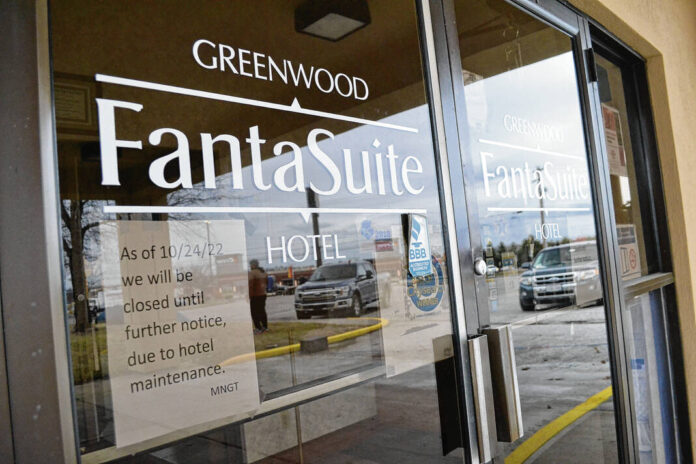Greenwood officials are denying most of the claims made by the Red Carpet Inn and Fanta Suites as the court case against the hotel continues.
Attorneys for the hotel, located at 1117 E. Main St., Greenwood, filed a counterclaim last month following a court ruling that granted city officials’ request for a preliminary injunction to force employees who reside at the troubled hotel to vacate the property and ruled that city inspectors must have access to the hotel for inspections. In the hotel’s counterclaim, Mubarak is seeking an award of damages as a result of inverse condemnation and other “just and proper relief.” Inverse condemnation is the act of a government taking property for public use while greatly damaging the value of the plaintiff’s property.
In court filings on Thursday, attorneys representing the city of Greenwood denied a majority of the allegations made by the hotel’s attorneys. One of the first things discussed was the hotel’s June 2021 inspection, which led to the initial vacation order. Numerous violations were found during this inspection, but the vacation was later delayed due to the issuance of a work permit for repairs the following November.
Josh Lowry, one of the hotel’s attorneys, argued in the hotel’s counterclaim that the alleged violations found in the June 2021 inspection posed no risk to the public. This is evidenced by the fact the city did not follow up on the June 2021 inspection until September 2022 — more than a year later, he wrote in the hotel’s response.
The city denied this in Thursday’s court filings as part of officials’ response to the counterclaim.
Later, city officials denied the hotel’s allegation that an October 2022 Advisory Plan Commission hearing did not include time restrictions for when employees could be present at the hotel. Jacob Bowman, an attorney representing the city wrote in filings that the city was “without knowledge or information sufficient to form a belief as to the veracity of the allegations,” court documents say.
Bowman also addressed the issuance of a stop work order last month. On Dec. 16, Building Commissioner Kenneth Seal attempted to schedule another inspection with Mubarak, however, Mubarak allegedly denied the request and referred Seal to his attorney due to the ongoing litigation, according to court documents.
While Clark had ruled that the hotel must follow the original agreement to vacate and make repairs, the stop-work order is still in effect. Attorneys for the hotel alleged the city is enforcing both the original agreement and the stop work order at the same time despite conflicting terms, court documents show.
The stop work order was removed earlier this month following an inspection on Jan. 5. In the city’s filings on Thursday, the city admitted Mubarak’s refusal to allow an inspection of the hotel to take place led to the issuance of the order, but denied the other allegations, according to court documents.
The city’s denials continued throughout the filing, as attorneys denied city officials were enforcing both orders at the same time despite conflicting terms and that they were making it “extremely difficult” to correct the violations, court documents say. City attorneys also denied they were referring to the hotel improperly as a single building when it is made up of approximately three main buildings.
City officials also denied the hotel’s claims that Building A had “drastically fewer” violations compared to the other building and that Seal had never informed the hotel of the opportunity to have just this separately inspected and reopened if the violations were resolved. They also denied the hotel’s claims that this building had been brought back up to code, according to court documents.
Attorneys also addressed several public statements made by Mayor Mark Myers about the hotel and possibly shutting it down.
After the September 2022 inspection, Myers told an Indianapolis TV station that murder suspects were taken out of the hotel and that prostitution had taken place there. He also reportedly said he intended to use the hotel as an example for other area hotels with issues, and said if the hotel didn’t get back up to code officials would try to condemn the property, court documents say.
Both Mubarak and the hotel’s attorneys have denied this, and say this has damaged the hotel’s reputation.
The hotel’s attorneys have argued Myers’ statements put pressure on city officials to close the hotel. They also allege the statements were made so Mubarak would be forced to close the hotel and sell the property to the city at a “discounted price,” court documents show.
However, city attorneys denied these allegations. They also wrote that the city was without knowledge to form a belief about the allegations that officials had made statements about wanting the property to be redeveloped, court documents say.
Near the end of the filing, city attorneys also gave notice of their affirmative defenses — evidence, which, if found to be credible, would negate liability, even if it is proven that the party committed the alleged acts.
City attorneys argue that Lodging & Trade, LLC — the legal entity operating as the hotel — failed “to state a claim upon which relief can be granted” and said the city was entitled to immunity under the Indiana Tort Claims Act. They also argued the hotel failed to mitigate its damages and that the alleged injuries/damages to the hotel were the “direct and proximate” results of hotel’s own actions, according to court documents.
“It was the legal duty of Lodging & Trade to maintain the hotel in compliance with all applicable local, state, and federal laws, regulations, ordinances, or other legal authorities,” Bowman wrote in court documents.
The city also denied the hotel’s allegations that officials were attempting to take the hotel via inverse condemnation, court documents show.
A pretrial hearing in the civil case is set for May 9.





